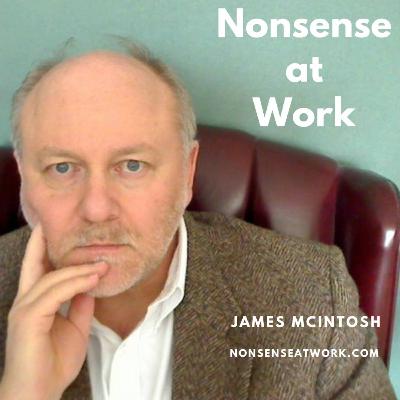Discover NonsenseAtWork
NonsenseAtWork

NonsenseAtWork
Author: James McIntosh
Subscribed: 2Played: 3Subscribe
Share
© James McIntosh
Description
Boost your career and success by learning to deal with the nonsense of pleasing a boss, playing nice with colleagues, making subordinates productive, and living a life. (Why should you learn to deal with nonsense at work? Because nonsense stops you from being successful. Nonsense is always at work. It never stops. That’s the bad news. The good news is that there is always some sense in nonsense, if you look for it. And if you are willing to look for it, time and again you will find that you can make the nonsense at work work for you.)
For more, visit https://nonsenseatwork.com
For more, visit https://nonsenseatwork.com
511 Episodes
Reverse
I have been aiming too low to hit my far-out goals. And then, in frustration, I have chosen new targets, ones too close to matter, too below the mark to make a real impact.
Speaking too fast is a common mistake. Here's why.
Sometimes we are tempted to stick to the letter and to ignore the spirit of the contract between workers and management.
Here's the thing about positions. Some people more than fill the position they are in and are soon promoted to something bigger.
We count on hope for a better future and we ignore bliss in the present. Then we act surprised when we land in the mud of the moment.
Nothing happens until you make a move. Your choice of first move is often limited. Yet, it sets in motion a series of actions that in looking back seem so obvious.
If you want your team to lose mind control, then ask them to begin by conjuring up good ideas. No brain can weave and swerve and speed up and brake unless properly warmed up.
Motivational gurus have conned us into believing that shouting a goal (the dream) in public or on social media will make us achieve it. Or risk being embarrassed. I think the concept is called "public commitment."
I wish that leaders will learn the really, really critical skill of knowing when to decide and when to delay deciding.
This is not a trivial question. This explains how we often attempt to make change happen.
Power corrupts. Or so we believe. And yet, it is feeling powerless which truly corrupts. Why? Because people who feel powerless often become dysfunctional.
Yes, I agree, we must often begin problem solving by making assumptions because we seldom have all the information we need. But we will create a more effective work environment if we start with constructive assumptions.
Now that I am wise to the burden of freedom, I see how freedom fathers too many dreams, which time relentlessly kills. In my case, I once wanted to be a yachtsman. Maybe a pilot. Or an engineer. Why not an architect? An artist! The list goes on.
Do you do things mainly to impress others? Or do you do things to accomplish something of consequence?
You cannot build a sustainable, competitive strategy based on what is wrong and what you are against. If you tried, the strategy you design would be to react to what-is or what-was.
Without mutual respect, mutual trust is dead in the water. And without trust, we are so f... flawed at collaborating that we might as well dust off our spears and aim for the caves.
Why do we react without thinking to gossip in groups, catty comments from colleagues, and prophecies spouted by political opposites? Because we don’t apply the Law of Two Feet. We don’t walk away.
Pay attention, because I am going to help you spot unreasonable people at work. What do you mean you don't need my help? You think you know unreasonable when you see it?
We set goals because we think we know what outcomes we want. We think we must do “this” because we want “that.” Yet, we don’t always think deeply about *why* we want what we want. Not deep enough to get clear on what we want it FOR.
Every day is the start of a new year. But we like to forget that, don't we? We prefer to wait 300-and-something days for a ritual that will energize us to kick off a few grand resolutions.





